|
|
The Darker Side of Cruising
| We were in paradise and I was having secret thoughts, thoughts I couldn’t share with anyone. Certainly, cruising in a warm climate was far better than working in
New York
midwinter. I should be grateful not discontent. We were approaching another beautiful island and I could tell from well offshore that it had lovely beaches fringed with palm trees, a volcanic skyline, and a peaceful anchorage. Yet, I was full of foreboding. Is the anchorage secure and do they have a sturdy dinghy dock, laundromat, accessible market, clean diesel, and potable water? Will checking in with customs and immigration be complicated? Will we know anyone? These are questions that roared through my mind every time we pulled up anchor, said good-bye to our friends, and continued on with our itinerant lifestyle. Yes, the quest was full of adventure, but it was also full of dread. In fact, moving to a new anchorage was not unlike moving to a new neighborhood where you had to start all over again every time – except it was much more complicated and frequent. First, you had to ask for permission to visit. Then you had to find out where everything was, often with a language barrier. When you were ready, you had to get there and back again. |
| We thought we’d have loads of time to do things we really wanted to do like writing, but we really didn’t. Everything took so much longer to do than back home. It got dark around
7 pm
in the
Caribbean
mid-Winter, so cruisers’
midnight
was
9 pm
. Because the days were short, more things were compressed into less time. |
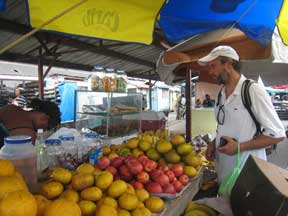 A journey to the markets for provisioning required major planning. Lists of course, but we needed a collection of carryall bags, a rolling cooler to keep items from spoiling over long distances, and backpacks to distribute weight on our bodies. We needed a cell phone that worked in the local area, guidebook, VHF radio for on water, FRS radios for on shore, handheld GPS to find our way back, local currency, credit cards, photo IDs, cameras, and ship’s papers to get duty free supplies. We’d organize it all, load it and ourselves in the dinghy, head for shore, search for the dinghy dock, gather our belongings, lock up the dinghy, and go in search of stuff. A journey to the markets for provisioning required major planning. Lists of course, but we needed a collection of carryall bags, a rolling cooler to keep items from spoiling over long distances, and backpacks to distribute weight on our bodies. We needed a cell phone that worked in the local area, guidebook, VHF radio for on water, FRS radios for on shore, handheld GPS to find our way back, local currency, credit cards, photo IDs, cameras, and ship’s papers to get duty free supplies. We’d organize it all, load it and ourselves in the dinghy, head for shore, search for the dinghy dock, gather our belongings, lock up the dinghy, and go in search of stuff. |
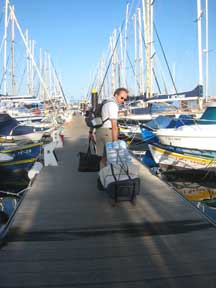 Once armed with a map, we’d hike to the food markets, stopping at every hardware-lookalike store along the way to see if we could source the bits and pieces that we hadn’t been able to find. Sign language and pictures helped. Often, it took more than one market to provision as some had meat, others produce, some had paper products, others canned goods, and so on. It was a sojourn that often took all day. Then we’d lug all the acquisitions back to the dinghy, stuff them and ourselves in, and make the return trip to the boat, hoping that everything hadn’t melted en route. We’d heft all the bags into the cockpit, being careful to first remove any packaging, like corrugated cardboard that can harbor families of cockroaches and other varmints and leave it behind in the dinghy. Finally, we’d carry our treasures below to stow. If we were lucky, we’d be done before dinner. Once armed with a map, we’d hike to the food markets, stopping at every hardware-lookalike store along the way to see if we could source the bits and pieces that we hadn’t been able to find. Sign language and pictures helped. Often, it took more than one market to provision as some had meat, others produce, some had paper products, others canned goods, and so on. It was a sojourn that often took all day. Then we’d lug all the acquisitions back to the dinghy, stuff them and ourselves in, and make the return trip to the boat, hoping that everything hadn’t melted en route. We’d heft all the bags into the cockpit, being careful to first remove any packaging, like corrugated cardboard that can harbor families of cockroaches and other varmints and leave it behind in the dinghy. Finally, we’d carry our treasures below to stow. If we were lucky, we’d be done before dinner.
Then the search for the trash disposal began because all the excess packaging created mountains of garbage. Some places, like the French islands, had recycling and garbage bins conveniently located near the dinghy docks. Other places had scheduled garbage pickups in specific places. A few of the islands had no disposal and some charged fees. Once again, it took effort to figure out.
Then, we’d realize we needed clean underwear. We’d check into the invaluable local VHF cruisers nets for laundry services
info
rmation. Self-service laundromats were still available in some places though often not easily found. We’d pack our laundry bags on a hand cart, grab our laundry chemicals along with all the change we’d collected for this purpose, our laptops and a book, pack ourselves into the dinghy, and go in search of the internet laundry cafe. |
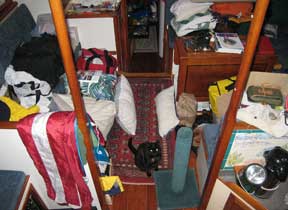 One such day we dragged ourselves with our laundry and laptops to the top of the hill where Lucinda’s Laundry resided. A line of clothes bags a mile long trailed out the door but one machine was dedicated to people doing their own washing. It was our lucky day. We’d arrived early enough to be first. We had four loads – sheets, towels, whites, and colors. The washer took 45 minutes, the dryer 60 minutes. So, with quick calculation we determined it would take at least 5 hours, hence the internet cafe appeal. Lucinda figured out that she could make more money keeping us online at $3/hour and selling coffee, pastries, and fruit juices than she could on laundry alone. Of course, when it was time to operate the machine, the mechanism was unlike any I’d seen, the instructions were in French, and it required a credit card instead of coins. Meanwhile, Alex had gone off with the credit cards and my cell phone didn’t work on this island. So I got on my FRS radio and recalled him for laundromat assistance. One such day we dragged ourselves with our laundry and laptops to the top of the hill where Lucinda’s Laundry resided. A line of clothes bags a mile long trailed out the door but one machine was dedicated to people doing their own washing. It was our lucky day. We’d arrived early enough to be first. We had four loads – sheets, towels, whites, and colors. The washer took 45 minutes, the dryer 60 minutes. So, with quick calculation we determined it would take at least 5 hours, hence the internet cafe appeal. Lucinda figured out that she could make more money keeping us online at $3/hour and selling coffee, pastries, and fruit juices than she could on laundry alone. Of course, when it was time to operate the machine, the mechanism was unlike any I’d seen, the instructions were in French, and it required a credit card instead of coins. Meanwhile, Alex had gone off with the credit cards and my cell phone didn’t work on this island. So I got on my FRS radio and recalled him for laundromat assistance.
Of course, Lucinda was counting on the fact that when you figured out how long it would take you would pay her to do your laundry instead. It may cost $10 US per load to do it yourself and $15 US to have it done for you. It’s a gamble as to who does a better job. That day I settled in with my laptop to pay bills and make the best of a hot day in the laundromat in paradise. Two days at anchor and we still hadn’t seen much beyond the laundry and the market.
|
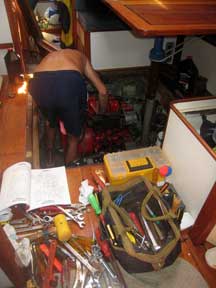 Of course, once the essentials were taken care of, the list of boat projects came into play. Parts had to be sourced, ordered and installed, which takes far longer and costs far more than back home. Packages shipped from either side of the
Atlantic
can take weeks to arrive and clear customs. If we didn’t prearrange for someone to take delivery, we’d risk the package being sent back. So we’d have to stay put and pay a broker to manage the delivery if we really wanted it. Suddenly, we’d been ‘there’ for a month and couldn’t account for our time. Of course, once the essentials were taken care of, the list of boat projects came into play. Parts had to be sourced, ordered and installed, which takes far longer and costs far more than back home. Packages shipped from either side of the
Atlantic
can take weeks to arrive and clear customs. If we didn’t prearrange for someone to take delivery, we’d risk the package being sent back. So we’d have to stay put and pay a broker to manage the delivery if we really wanted it. Suddenly, we’d been ‘there’ for a month and couldn’t account for our time.
When we realized we needed to break away and see the sights, we’d take our folding Montague bikes ashore. It took a bit of effort to load them into the dinghy, assemble them onshore, and secure them to some permanent structure where they wouldn’t disappear overnight. But if we were willing to risk our lives on the roads shared with vehicles of every description driven in maniacal ways, it was a great pace at which to experience the place. These full-sized mountain bikes were invaluable in places where dirt roads are still common and the
marina
s are well out of town.
|
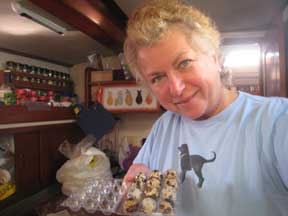 We also travelled many islands by bus. For $1-2 EC ($2.67
Eastern Caribbean
= $1 US) we rode as far as we wanted. They weren’t typical buses but rather vans with seats fitted into every square inch of space. You might be wedged between two large people with huge packages. The driver might really like reggae and play it at full volume. Most loved to toot their horns announcing their breakneck passage. But they got us around really well. We also travelled many islands by bus. For $1-2 EC ($2.67
Eastern Caribbean
= $1 US) we rode as far as we wanted. They weren’t typical buses but rather vans with seats fitted into every square inch of space. You might be wedged between two large people with huge packages. The driver might really like reggae and play it at full volume. Most loved to toot their horns announcing their breakneck passage. But they got us around really well.
Occasionally, we’d rent a car to explore further. This was expensive and often required the additional purchase of a temporary driver’s license at the local police station. We therefore usually organized other couples to share the car. Driving in the islands was an ‘experience’ and progress usually slow. The cars often lacked the muscle and the roads were often very narrow, sort of paved, twisty, or frighteningly steep. It was a small wonder then that we rarely saw any speed limit signage.
The heat often got to us. If you moved a finger you’d sweat buckets. It never rained, so the sky was perfectly blue every single day with no relief. I found myself wishing for a rain cloud. Just one. Topping off our fresh water tanks became increasingly difficult as fresh potable water became scarcer in a season that brought less rain than any other in recent history.
To cool off, we’d go snorkelling. We’d organize all our gear, don wetsuits (you get cold even in 83 degree water), prepare the dinghy with fuel, anchor, drinking water, towels and a boarding ladder so we could get back onboard, and go for a swim with the fishes. In some places, the coral was glorious. In others, it was bleached or broken. It took time to find the right spot but we persevered and loved it.
|
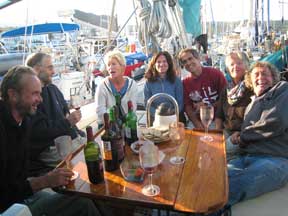 Suddenly, when we’d been in one place a while, it was time to move on. Perhaps the hardest thing was saying good bye to all our new friends. (I skipped the part about shared dinners and happy hours which really was a blast. Next story.) It felt like we were constantly saying farewell, either tearfully or gleefully. The itinerant lifestyle was becoming a bit trying. In our case, it was about half way up the
Caribbean
that we started to feel disconcerting emotions. We began thinking we might want to go home. Were we overreacting? We had started out thinking about circumnavigation. Instead we were thinking in terms of being half way home. We got excited. We started making plans for what we would do back home and where we would cruise from there. Hang on. Cruise from there? Yep, it’s not that we don’t like cruising; it’s that we rethought the type of cruising we really like. Suddenly, when we’d been in one place a while, it was time to move on. Perhaps the hardest thing was saying good bye to all our new friends. (I skipped the part about shared dinners and happy hours which really was a blast. Next story.) It felt like we were constantly saying farewell, either tearfully or gleefully. The itinerant lifestyle was becoming a bit trying. In our case, it was about half way up the
Caribbean
that we started to feel disconcerting emotions. We began thinking we might want to go home. Were we overreacting? We had started out thinking about circumnavigation. Instead we were thinking in terms of being half way home. We got excited. We started making plans for what we would do back home and where we would cruise from there. Hang on. Cruise from there? Yep, it’s not that we don’t like cruising; it’s that we rethought the type of cruising we really like.
The more we thought about it, and the more we started to talk to other cruisers, a definite thread started to form. Little by little, people started ‘fessing up that they too were feeling similar things. One cruiser said, “I don’t want to seem ungrateful because here we are in paradise. So many people are having it so hard back home, and I have it so easy in comparison. But I am terribly bored. I want to go home and see my friends and not say good bye but see you next week. I want to find a new job, something I will really enjoy doing. I want access to culture. I just think I need more than this. But it sounds so ungrateful that I cannot mention it to anyone. No one would understand.” And believe me when I tell you that people back home really don’t understand.
|
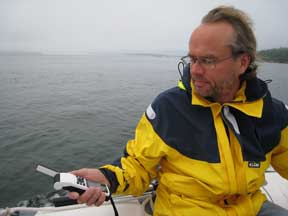 Several couples learned the hard way that they had bought the wrong boat for their journeys, and for them the questions were even more poignant. They would be returning home to exchange boats and restart their dream a second time. We, on the other hand, learned we had chosen the right boat for us, though if we had unlimited resources, perhaps a newer model would involve a bit less maintenance. Then again, most of the things that broke on our journey were the new things we “upgraded” to. Several couples learned the hard way that they had bought the wrong boat for their journeys, and for them the questions were even more poignant. They would be returning home to exchange boats and restart their dream a second time. We, on the other hand, learned we had chosen the right boat for us, though if we had unlimited resources, perhaps a newer model would involve a bit less maintenance. Then again, most of the things that broke on our journey were the new things we “upgraded” to.
We have crossed the
Atlantic
three times now and know that for us, being out at sea for too long can get boring. Crossing the
North Atlantic
was terrifying and boring as we had to contend with six gales and a strong storm which had us hove to for 36 hours twice. Crossing the lower
Atlantic
was frustrating and boring as the normal trade winds decided to dissipate that year so it seemed to take forever. And crossing the middle was magical and boring thanks to the sightings of whales, dolphins, flying fish, and hordes of jelly fish and the birthday party when friends rafted up with us mid-ocean as there was little wind and we had to motor alot. We’ll always remember the moments that stood out and be grateful for a really good library onboard for the rest.
Our trip taught us that we like having a home base to sail from. We returned to
Ireland
where we have family, friends, and changes of seasons, all of which we need to keep our souls in tune. We’ll use our base to sail north to
Scotland
,
Scandinavia
,
Iceland
, the Baltics and
Russia
, and south to
Spain
,
Portugal
,
France
and the
Mediterranean
. We’ll have glorious diverse cruising grounds that offer cultural attractions as well as natural splendour to keep us busy for years. We’ve found our ideal cruising solution. And yes we are already talking about crossing the pond again to explore the western
Caribbean
.
|
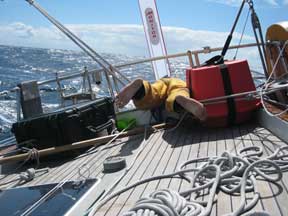 We wondered about the
Atlantic
versus the Pacific. Many cruisers told us that the Pacific is more desirable to visit but less desirable to sail as distances between destinations are much longer and conditions less predictable. They cautioned that once you enter the Pacific you are pretty much committed to going all the way. We may still do it another time. We wondered about the
Atlantic
versus the Pacific. Many cruisers told us that the Pacific is more desirable to visit but less desirable to sail as distances between destinations are much longer and conditions less predictable. They cautioned that once you enter the Pacific you are pretty much committed to going all the way. We may still do it another time.
People who had circumnavigated expressed unique fears as they approached home. It was like having gone to the moon so they didn’t know what they could possibly do to top it. One couple is trading their boat for an RV to cruise by land. Others are afraid that the world has passed them by. Their friends have changed, their neighbourhoods have moved on, they have few connections to the former life they left 15 years ago. Assimilating anew is striking fear in their hearts. Will they be able to afford a place to live? Will their children fit in? What about jobs? They’ll be competing with so many others. It is a frightening prospect, but one they are confronting just as they once faced crossing oceans. You learn a lot out there.
A few people we’ve spoken with are devastated that they sold their homes with a commitment to sail for years only to learn that it wasn’t for them. They feel a need to go on because they told everyone they would and have no home to return to. That could be a source of discontent for many years.
We are enormously grateful that we now understand more about ourselves, about our boat, about different cultures, about what we really want out of life. We know that for us the lifestyle is great for finite stretches of time. Perhaps the most important thing we learned is letting life happen without planning every moment. We are delighted to have discovered new things we may never have planned to encounter. We’ve found our perfect balance.
|
P.S. We’ve been home for a month now and we’re desperate to go back to sea. We are exhausted. Forget about home being where the heart is. Home is where the WORK is. Now, I remember what it was that drove us to sea. That dreaded four-letter word, W-O-R-K.
The car had a flat tire and dead battery. We tried to launch our runabout but the engine wouldn’t start. We schlepped everything from onboard by dinghy then washed it all. I lost count after 20 loads in the laundry and dishwasher – all the sheets, towels, rugs, clothes, dive gear, awnings, sails, covers, dishes, glasses, utensils, pots and pans, etc. All the tools had to be cleaned and oiled. Everything had to be stowed. But we had to clean the house and garage of a year’s worth of dust and cobwebs first. The gardens were overgrown with mammoth weeds. The wheel barrow had a flat tire. The driveway needed power washing and sealing. The berries and fruit were all ripening at the same time so we had to harvest and process while we could. There is internet and TV on demand. Life is melting away.
Get those guide books and charts out and let’s go. NOW! The sea is freedom. I can see that now. Forgive me Father for I have sinned, my last confession was not one minute ago...
|
|
|